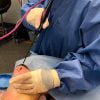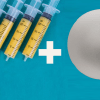Timing COVID vaccination before elective plastic or cosmetic surgery
-If you have the ability to be vaccinated pre or post-operatively, you should proceed with vaccination so long as it is separated from your plastic surgery by at least one week.[1]
-Vaccination can lead to fevers and flu-like symptoms in a small percentage of people. More common reactions such as fatigue, headache, and soreness at the injection site are more common and usually clear up within 48 hrs in the vast majority.
-As surgery can sometimes cause fevers, it is important to separate the two to be able to determine if feeling unwell after a procedure is due to the vaccine or a rare surgical side effect such as an infection
-Systemic side effects are reported slightly more often in the Astra Zeneca compared to the Pfizer vaccine and are more common with the second dose and in younger age groups
-Astra Zeneca has led to some very rare adverse events including blood clots. Due to the small number of events, there is no evidence as to how these relate to the increased deep venous thrombosis risk with surgery. However, it would be prudent until further information is available to ensure you are fully mobile prior to having this particular vaccine if concerned. Prolonged surgeries do have an increased risk of deep venous thrombosis.
To read more about the clotting risks here.
-If you are unwell for a longer period following the vaccine, your elective surgery may need to be postponed
Benefits of being vaccinated before surgery
-Based on the high risks that surgical patients face, scientists have calculated that vaccination of surgical patients is more likely to prevent COVID-19 related deaths than vaccines given to the population at large – particularly among the over-70s and those undergoing surgery for cancer.[2]
COVIDSurg estimated that globally, prioritising all surgical patients for preoperative vaccination ahead of the general population is projected to prevent an additional 58,687 COVID-19-related deaths in one year.[3]
How the COVID vaccines works
You cannot get a COVID-19 infection from a vaccine itself — that’s because there is no COVID-19 component to the vaccines.
Pfizer COVID vaccine
Pfizer vaccine requires two doses 21 days apart. The Astra Zeneca second dose can be given at 4-12 weeks following the first.
Pfizer is an mRNA vaccine which means it does not contain any weakened or dead parts of a virus. mRNA, delivered to your body’s cells by lipid nanoparticles, instructs the cells to generate the spike protein found on the surface of the novel coronavirus that initiates infection.[4] Instructing cells to generate the spike protein spurs an immune response, including generation of antibodies specific to the SARS-CoV-2 spike protein.3
Astra Zeneca COVID vaccine
Astra Zeneca is a viral vector vaccine. It uses a chimpanzee adenovirus vaccine vector which is a harmless, weakened adenovirus that usually causes the common cold in chimpanzees. It has been modified to contain genetic material shared by the coronavirus although it can’t cause the illness or adenovirus in humans. It teaches the body’s immune system how to fight the coronavirus.
Side effects of COVID vaccines
Fatigue and local reactions at the injection site (pain, swelling, redness, itching, swollen armpit glands) affected two out of three people, and are much more common than fever. Most mild side effects of COVID-19 vaccination tend to clear up within 48 hours of injection.
Other side effects can include tiredness, headache, muscle pains, fevers, chills and nausea. Most of these resolve within a few days in people. More prolonged flu like symptoms are reported but rarer.
Side effects are more pronounced among younger people than older people, likely because their immune systems are more robust.
The reactions are an indication that the vaccine has triggered an immune system response (which is what it is supposed to do).
It is more common to see reactions after the second dose.
Around 7% percent of people 18-55 yrs old reported fever after the first dose of the Pfizer vaccine, compared to 31 percent after the second dose. 3 percent of people over 55 reported fever after the first dose, with 21 percent reporting fever after the second dose.[5]
Don’t
How effective is each dose of COVID vaccine for virus protection
Pfizer and Astra Zeneca COVID vaccines are available in Australia.
Both in a recent study have been found to be equally effective, with no real difference in the level of protection offered.[6] The results revealed the odds of being infected after two doses of either vaccine were reduced by 70% compared to unvaccinated individuals without evidence of prior infection.
Some other clinical trials have shown even greater efficacy. The disparity in efficacy rates are likely due to vaccines performing differently in the real world compared with clinical trials which may have different age groups and populations.
Another Israeli study published in JAMA, estimated that the Pfizer vaccine is 97% effective against symptomatic infection and 86% against asymptomatic infection among healthcare workers.[7]
Yet another recent study published in JAMA, based on U data S, showed vaccination with Pfizer reduced the risk of both asymptomatic and symptomatic infection by 96% in fully vaccinated healthcare workers and reduced to 90% for asymptomatic infections.[8]
The first dose of vaccine improves immunity by about 50 percent. Around 2 weeks after the second dose vaccine protection against symptomatic COVID-19 rises to 95 percent.
Get vaccinated here.
Current COVID policy if coming to the hospital or an appointment with Dr Simone.
[1] COVIDSurg Collaborative, GlobalSurg Collaborative. SARS-CoV-2 vaccination modelling for safe surgery to save lives: data from an international prospective cohort study. The British journal of surgery. 2021.
[2] Royal Australasian College of Surgeons. Australian patients should receive COVID-19 vaccine before surgery to reduce risk of postoperative death – study https://www.surgeons.org/en/News/media-releases/australian-patients-should-receive-covid-19-vaccine-before-surgery
[3] COVIDSurg Collaborative, GlobalSurg Collaborative. SARS-CoV-2 vaccination modelling for safe surgery to save lives: data from an international prospective cohort study. The British journal of surgery. 2021.
[4] 2 Understanding mRNA COVID-19 vaccines. CDC. Accessed January 19, 2021. https://www.cdc.gov/coronavirus/2019-ncov/vaccines/different-vaccines/mrna.html
[5] FDA Briefing Document Pfizer-BioNTech COVID-19 Vaccine. Vaccines and Related Biological Products Advisory Committee Meeting December 10, 2020 https://www.fda.gov/media/144245/download
[6] Pritchard E et al. Impact of vaccination on SARS-CoV-2 cases in the community: a population-based study using the UK’s COVID-19 Infection Survey.https://www.medrxiv.org/content/10.1101/2021.04.22.21255913v2.full-text
[7] Yoel et al. Association Between Vaccination With BNT162b2 and Incidence of Symptomatic and Asymptomatic SARS-CoV-2 Infections Among Health Care Workers
[8] Tang et al. Asymptomatic and Symptomatic SARS-CoV-2 Infections After BNT162b2 Vaccination in a Routinely Screened Workforce. https://jamanetwork.com/journals/jama/fullarticle/2779854





